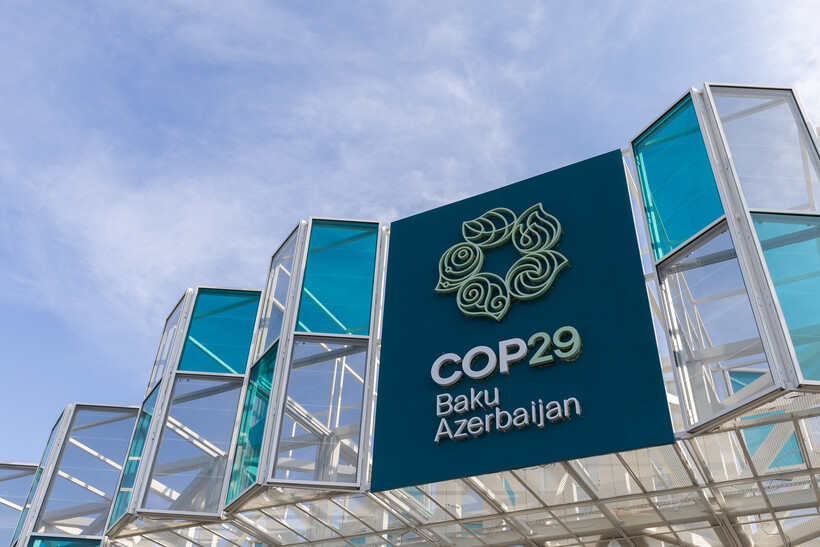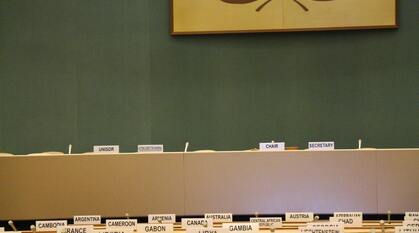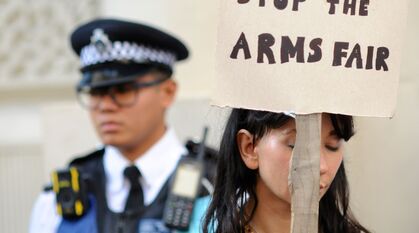Finance and false solutions at COP29
Lindsey Fielder Cook, Interim Deputy Director and Representative for the Human Impacts of Climate Change at the Quaker United Nations Office, reports back from COP29.

The atmosphere during the recent climate change Conference of Parties 29 (COP29) in Baku, Azerbaijan, at times felt ominous. Trust between countries, always fragile, received hard blows.
The wider political influences
At its core, the COP29 was about increasing financial commitments from developed to developing countries, at a time when the wealthiest and highest greenhouse gas (GHG) emitting developed country was likely to leave the process. More widely, the COP was held in a dangerous time for international relations. Powerful member states threaten use of nuclear weapons, block ceasefires and remain silent over a plausible case of genocide and attacks on UN agencies, openly reject the highest legal voices (International Court of Justice and International Criminal Court), and systemically underfund multilateral bodies while global military spending now surpasses 2.4 trillion USD. The COP29, like the recent UN Summit of the Future in September, the biodiversity COP and negotiations for a treaty on plastic pollution, have all been affected.
The COP29 began with host nation Azerbaijan referring to fossil fuels as a "gift from God". In the negotiation room, countries discussed greenhouse gas (GHG) emissions mitigation, yet nearly every fossil fuel wealthy country in the room planned oil and gas production increases which would eliminate chances for a 1.5°C global temperature rise limit.
The denial in the room is no longer about the dangers of climate change – this is agreed. The denial now regards the 'how' as countries look to false solutions including geo-engineering. Too few decision makers are ready to honestly address root causes driving planetary crises in our unsustainable and inequitable energy, economic and agriculture systems. Nonetheless, there are some brave actors in the room including Colombia, which announced a cap on fossil fuel extraction. Meanwhile the UK reiterated Labour's manifesto commitment to cap new oil and gas licences.
What was agreed, what is at stake
Leading up to the COP29, negotiators had three years to prepare a new collective quantified goal for climate finance (NCQG), set to replace and update the '100 billion USD a year by 2020' promise critical to establishing the 2015 Paris Agreement. However, that 100 billion USD a year did not materialise fully until after 2020, and harmed trust in this process.
Over the years, civil society including the Quaker United Nations Office and Quakers in Britain have proposed approaches that would make polluters pay, including fair sources of finance for loss and damage (PDF). The Paris Agreement committed developed countries to lead on financing and mitigation; they have the highest per capita GHG emissions, the highest historical emissions, and in most cases benefited financially from colonisation.
However, at the COP29 we witnessed stand-offs, last minute drafts, selective sharing, walkouts, and final language mirroring the last ineffective finance deal. Specifically, inclusion of the word 'by' in the clause "with developed countries taking the lead, of at least USD 300 billion per year by 2035". The 'by' allows 11 years for full delivery. The text also contains no clear commitment to protect sufficient grants rather than loans that exacerbate debt, it includes many references to private finance over public finance, and no analysis on the diluting impact of inflation.
There were decisions relating to the Global Goal on Adaptation, though again without sufficient funding. A decision to extend the enhanced Lima work programme on gender was met with efforts to weaken previously agreed language relating to gender and human rights language. Finally, there were decisions on guidelines for implementation of carbon markets proposed in Articles 6.2 and 6.4 of the Paris Agreement. Carbon markets are not supported by most civil society voices at the COP29. They are essentially 'carbon offsetting' for high GHG emitters failing to sufficiently mitigate their own emissions. Carbon markets do not reduce greenhouse gas emissions 'at source', have a history of ineffectiveness, abuses of Indigenous Peoples and human rights, and fail to recognise increase of eco-system collapse under rising temperatures.
Quaker action at COP29
At the COP29 we prepared and translated toolkits for negotiators on the latest climate science, and booklets for grassroots action on 'what we can do'. We distributed a briefing paper on the risks of geo-engineering reliance on carbon dioxide removal (CDR). We helped author an interfaith statement for the COP and helped plan and facilitate an interfaith Talanoa Dialogue with faith voices from around the world. We coordinated Quaker voices in global civil society demands for the COP Presidency to protect human rights in climate action. We co-hosted with Quakers in Britain and Quaker Earthcare Witness an official COP event titled, What Really Makes us Safe?, and in a COP Press Conference asked the same question before journalists: why do we beg for climate finance to support needed root cause transitions and help people experiencing loss and damage, while trillions are spent on weapons to oppress and kill? Throughout, we met with a diverse group of negotiators to talk through hopes and concerns, as part of our quiet diplomacy efforts here to build communication between countries.
We hold to Quaker testimonies as a clear witness to peace and justice. "Do not be afraid to say what you have found and what you value." As Quakers, we can bring vision to overcome fear. A vision of transformations which promote clean air, clean water and healthy wildlife, promote public transport, public health and education, promote clean and more equitably owned renewable energy, sustainable and just economic systems, more equitable societies, restorative agriculture and healthy diets. The story of Care for Creation – to walk cheerfully in this world, a witness to love not fear, to regeneration not destruction.


